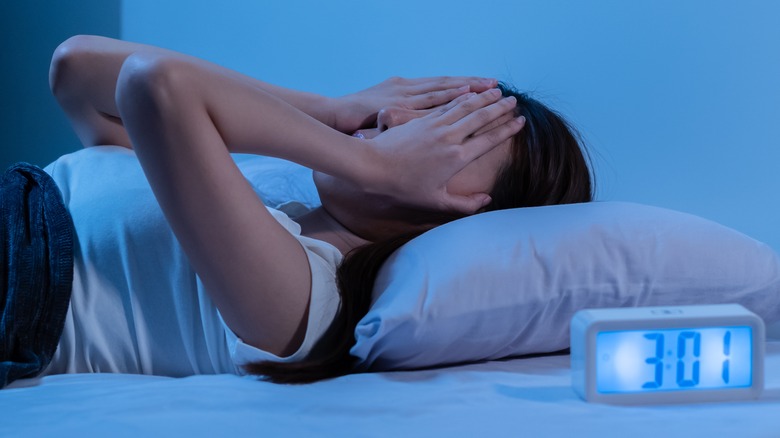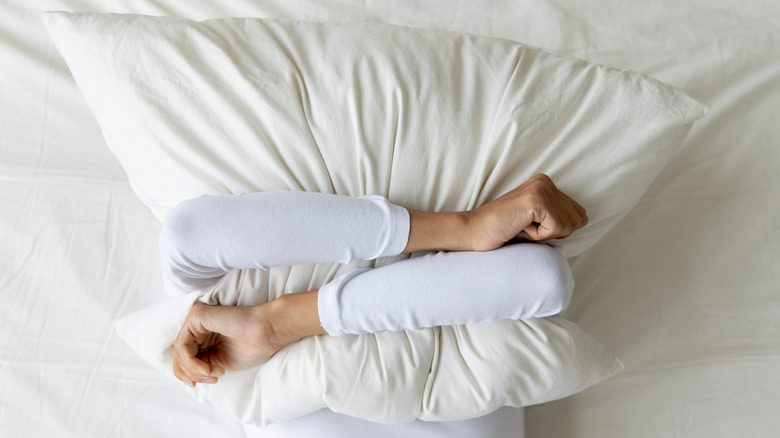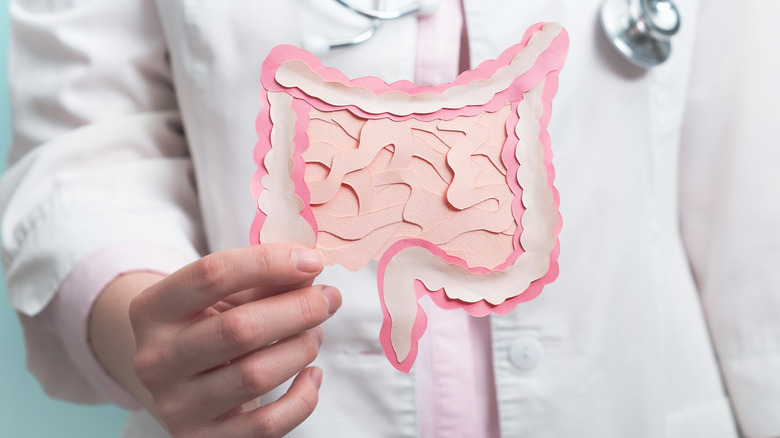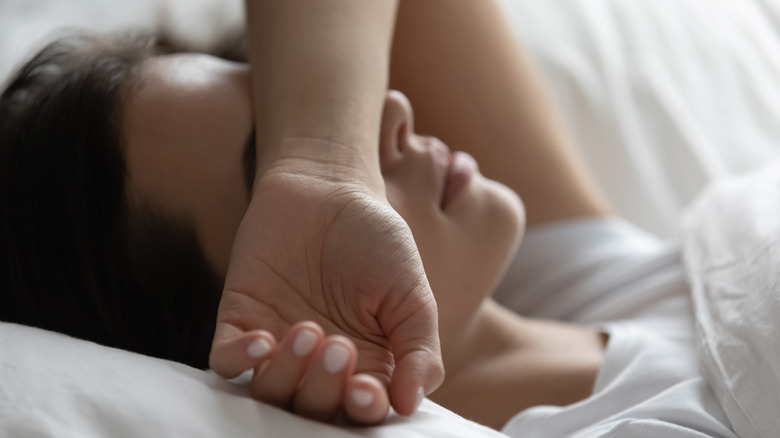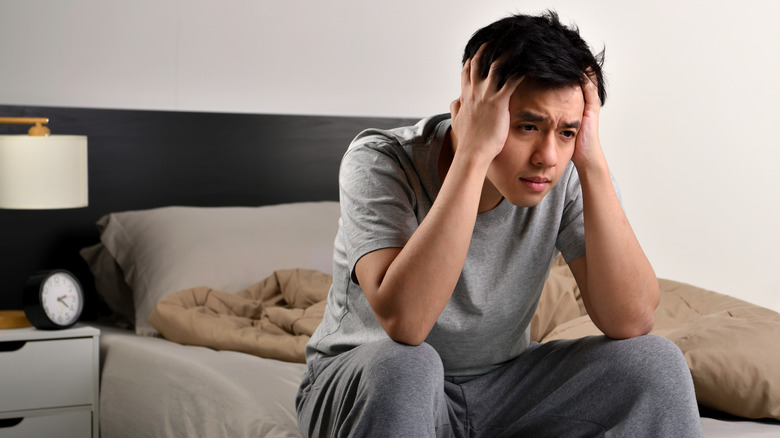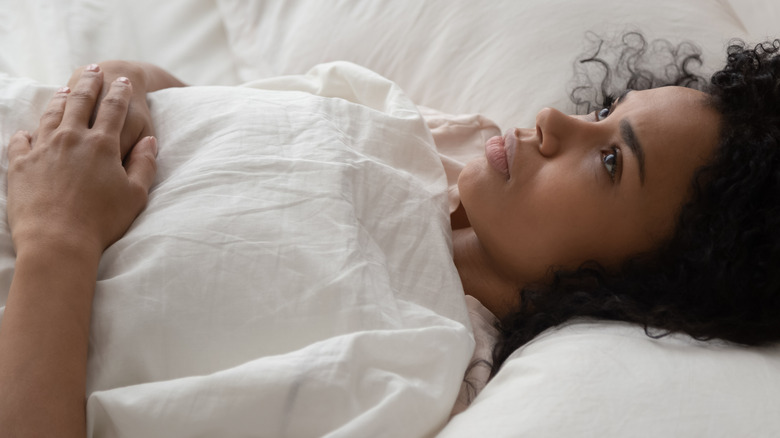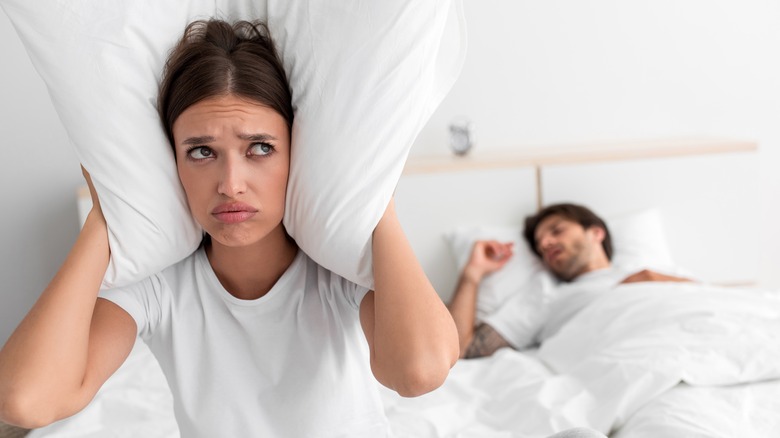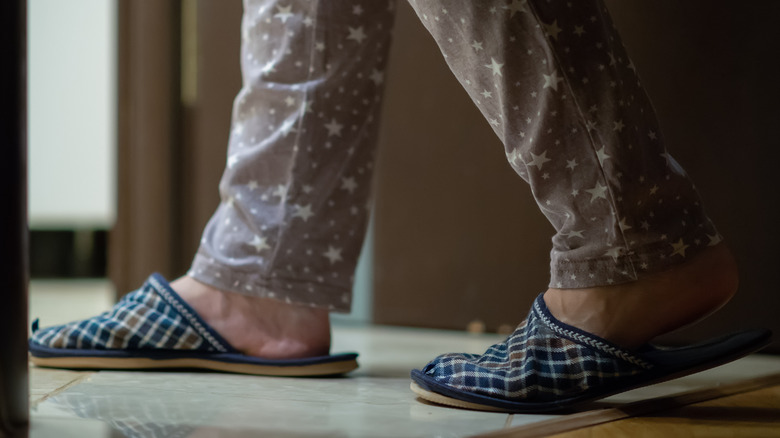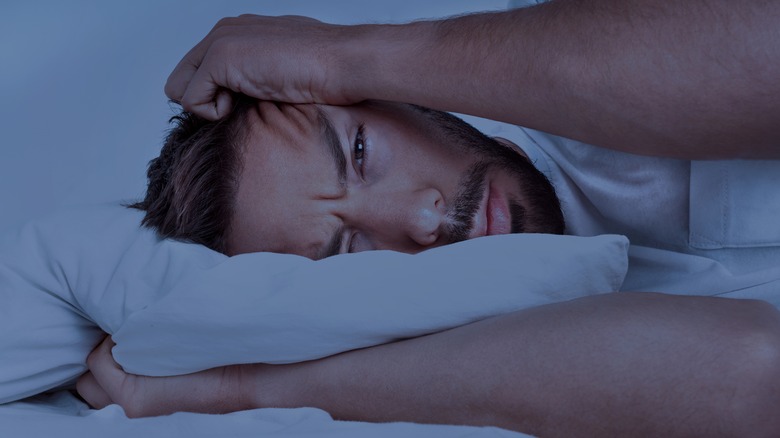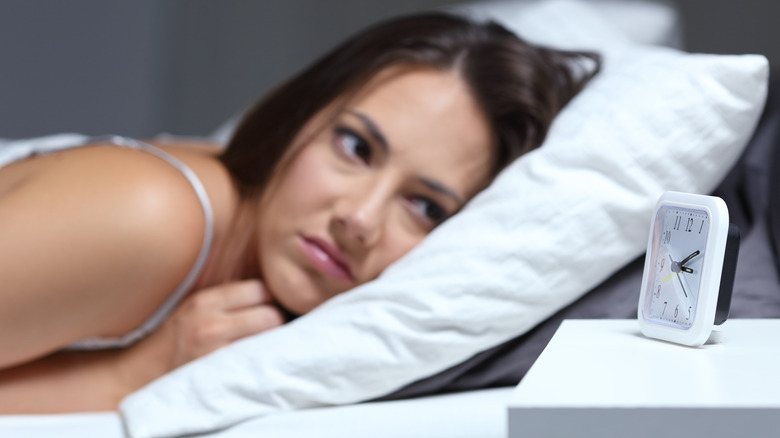12 Reasons Why You Keep Waking Up In The Middle Of The Night
It's 4 a.m. and something has woken you up again. But the precise cause of your midnight awakenings remains to be known.
Nighttime wake-ups can stem from a number of different reasons, ranging from environmental problems to physical health issues to poor sleep hygiene (via BMC Psychiatry). A study published in the Journal of Psychosomatic Research found that 31.2% of people woke up in the middle of the night for at least three nights of the week. This is one of the most common sleep disturbances, affecting at least a third of the general population in the U.S. (via Journal of Psychiatric Research).
It's also common for people who wake up at the same time everyday, per the Cleveland Clinic. Getting up before you've had a full night's sleep doesn't necessarily mean that there's a major problem, but it can sometimes act as a warning sign about your health. What's more, it can take a huge toll on your daily life. Here are some possible sleep stealers that may be at the root of your nocturnal awakenings.
You're feeling stressed or anxious
Stress and anxiety can mess with your sleep in various ways (via Sleep Science). When your mind is in overdrive, you may have a hard time drifting off (via Aging & Mental Health). You may also find yourself waking up at ungodly hours, wide awake, and unable to fall back into slumber.
Stress triggers the release of cortisol into the bloodstream, which is your body's natural stress hormone, per Sleep Science. When cortisol is elevated, it tends to stay high for a while. This puts you on high alert. The hormone is naturally released a short time after you rise in the morning, stimulating wakefulness, and it's usually at its lowest around midnight. However, some people have chronically high levels of cortisol due to stress, which can play havoc with their sleep-wake cycle.
Sometimes, intrusive thoughts and unsettled feelings can be subconscious, per Healthline. You may not consciously realize that stress is the culprit for your sleep problems, since your worries may not be obvious — in which case it might seem as though you're awakening for no apparent reason.
If you're caught in a vicious cycle of stress and sleeplessness, there are a number of ways to gently bring down soaring cortisol levels (via Rise Science). Some people find it helpful to slow down the body and mind by taking a warm bath or reading a book. It can also help to stay off electronic devices in the hours leading up to sleep.
Your gut bacteria might be to blame
There's evidence that your gut bacteria could be waking you up. Research has shown that an imbalanced gastrointestinal microbiome may cause or prolong sleep disturbances throughout the night (via Frontiers in Psychiatry). This may tie back to the domino effects of stress, as noted by Rise Science. High levels of cortisol can have a direct negative impact on gut health by wiping out the beneficial bacteria and upping the harmful bacteria in your intestines. This, in turn, can interfere with the absorption of nutrients, as well as affecting the quality and duration of your sleep.
A depleted gut microbiota can also mean that your body is unable to properly break down tryptophan into serotonin, per Frontiers in Psychiatry. This is one of the main neurotransmitters in your brain that helps regulate mood and sleep (via Neuron).
Taking prebiotics has been shown to improve both REM and non-REM sleep, according to a 2017 study from the journal Frontiers in Behavioral Neuroscience. These are the primary stages of sleep that are needed for us to feel properly rested and refreshed.
Your blood sugar levels are low
Blood sugar fluctuations are fairly normal throughout the night and generally don't pose any concerns (via Trends in Endocrinology and Metabolism). However, some people experience a dramatic dip in blood glucose levels while sleeping (per CDC). This can arise from a number of different causes, such as not eating enough carbs throughout the day or an imbalance of fat, protein, and fiber in your meals. You may wake up with symptoms like a racing heart, irritability, sweating, and nervousness. Each person experiences low blood sugar differently.
If your blood sugar drops too low, your adrenal glands send a signal to your brain by releasing stress hormones like cortisol, as noted by PeaceHealth. This helps bring blood glucose levels back to homeostasis. But it's also responsible for that sudden bolt of energy coursing through your body at the crack of dawn.
A quick fix can be to have a light snack, preferably something containing protein, like a handful of nuts, notes CDEC. This can help you fall back to sleep by stabilizing blood sugar levels. It can also help to eat regularly, consume a balanced diet, and avoid skipping meals throughout the day, reports Diabetes.co.uk.
You're drinking alcohol or smoking too close to sleep
Caffeine is known for playing havoc with your sleep. But alcohol and cigarettes might be even more detrimental, according to a 2019 study published in Sleep. Although they may appear to bring you some comfort at the end of a long day, your drinking or smoking habits could be keeping you up at night.
The researchers discovered that people who ingested nicotine and drank alcohol within four hours of going to bed experienced the greatest disruptions to their sleep patterns (via Sleep). The consumption of nicotine, in particular, caused people to have forty minutes less sleep overall. This included smoking, vaping, and other ways of ingesting nicotine.
Previous studies have shown that nicotine can result in fragmented sleep and lower sleep efficiency, which may cause you to awaken in the middle of the night, per Sleep. As a stimulant, nicotine can do a real number on the body by creating an imbalance in neurotransmitters that affect your sleep. Your body also goes through the early stages of nicotine withdrawal as you're sleeping. The study authors advise that you avoid nicotine and alcohol use in the evening to aid sleep continuity.
You could have a nutrient deficiency
If you find yourself awakening during the darkest hours of the night, your body may be lacking some essential nutrients (via Public Health Nutrition). There are certain nutrient deficiencies that can affect the quality or duration of your sleep. For example, low levels of vitamin D and sleep troubles often go hand in hand (via Nutrients). The sun is your best source of vitamin D, which plays a critical role in the production of melatonin, a hormone that helps to regulate your circadian rhythms and sleep-wake cycle. Out-of-whack melatonin levels are likely to cause all sorts of sleep issues, including shorter sleep duration and nocturnal awakenings. You should be consuming around 600 IU (international units) of vitamin D each day, recommends the NIH. You can find this in foods like mushrooms and eggs.
A magnesium deficiency could also be causing you to get up in the middle of the night, notes a study published in the Journal of Research in Medical Sciences. The mineral has long been associated with sleep and is often recommended as a key supplement for your bedtime routine. Magnesium is responsible for over 300 metabolic reactions that occur in the body. It can help you relax by quieting your nervous system. It does this by increasing gamma-aminobutyric acid (GABA), a neurotransmitter that helps induce feelings of calmness. Magnesium supplementation has been shown to reduce early morning awakening, which tends to occur more frequently as we get older.
It might be a hormonal issue
Waking up every night while it's still dark outside could be a sign that there's something off with your hormones, as noted by Yale Medicine. Nocturnal awakenings are sometimes an indicator of an imbalance. For example, menopausal women often experience irritability and night sweats due to hormonal fluctuations, prompting them out of bed at unwanted hours.
On the other hand, it could just be that time of the month again, per Yale Medicine. Progesterone, also referred to as the "relaxing hormone," produces mild sedative-like effects and acts as a sleep aid in the body. A woman experiences a dramatic dip in progesterone during her period, which can make it harder than usual for her to get a steady night's sleep. Seven out of 10 women report changes to their nightly sleep patterns, which usually occurs three to six days before menstruation, details the Sleep Health Foundation.
This explains why many women with polycystic ovary syndrome (PCOS) also struggle with their sleep (via Yale Medicine). The condition is characterized by elevated testosterone and depleted levels of progesterone.
You could have sleep apnea
People with sleep apnea experience pauses in breathing as they're sleeping (via Johns Hopkins Medicine). This can occur throughout the night, for up to 20 or 30 seconds at a time. It happens when the airway at the back of the throat becomes obstructed or collapses, making it difficult for you to inhale and exhale normally.
These breathing disruptions aren't just a nuisance; they can also cause a host of health problems such as high blood pressure, heart problems, and headaches. And unsurprisingly, they can result in a pretty lousy night's sleep.
If you're struggling with sleep apnea and your breathing becomes shallow or keeps pausing, you may find yourself tossing and turning throughout the night. Some people may thrash and kick about under the duvets as their oxygen levels plummet. Many individuals start snoring or snorting. Often, people with sleep apnea awaken periodically, gasping for air. But it's not uncommon for people to wake up in the middle of the night without realizing that they have abnormal patterns in their breathing.
You may have nocturia
Another reason why you might be rising throughout the night is the frequent need to urinate, medically termed nocturia (via Sleep Medicine Research). Getting up multiple times throughout the night to pee can negatively impact your sleep. It can lead to fragmented sleep, poor quality sleep, and excessive daytime sleepiness. Some people might find it hard to fall back into slumber, especially if they've taken several trips to the bathroom. This can also increase an individuals' chances of falling over and injuring themselves (via The Journal of Urology).
Nocturia has a number of possible causes, a key one being bladder overactivity, per Sleep Medicine Research. One explanation for this is that the body naturally experiences a decline in the antidiuretic hormone vasopressin (via Current Aging Science). This tends to happen as we get older, but it can affect us at any age. Vasopressin regulates water conservation in the body by reducing excessive water loss through urine. In other words, having low levels of vasopressin will make you pee more frequently.
Be sure to consult your doctor if you think you might be struggling with nocturia. The condition is often minimized and brushed aside, especially by women, say researchers (via American Journal of Lifestyle Medicine). It may not signal any major health issues, but in rare cases, it could be connected to a more serious medical problem.
Frequent urination is sometimes caused by prediabetes
Frequent mid-night awakenings may also point towards blood sugar problems, per Diabetes Care. Both type 1 and type 2 diabetes can set off a wide spectrum of sleep disturbances. Just as blood glucose levels can plummet, they may also skyrocket while a person is sleeping, known as nocturnal hyperglycemia.
Soaring blood sugar levels can cause irritability, headaches, and the persistent urge to urinate, as noted by Diabetes.co.uk. Restless leg syndrome is another irking symptom of rapidly fluctuating blood glucose levels. This is marked by an uncomfortable sensation in the legs, such as tingling or aching, which triggers the urge to fidget and move. This can be a nuisance when you're trying to get some shuteye.
Ignoring hyperglycemia at nighttime can do a number on your health over time, warns diaTribe. It can damage your nerves and blood vessels, taking a toll on the health of your eyes, heart, and kidneys.
A strategy for keeping blood sugar levels stable throughout the night is to avoid eating dinner in the hours leading up to bedtime, recommends diaTribe. In particular, steer clear of high-carb and starchy foods like pizza and pasta, as these can lead to a post-meal blood sugar spike, which can have a knock-on effect on your glucose levels as you sleep.
Your liver function may be imbalanced
If you persistently find yourself waking up before you've had your full cycle of sleep, it could be worth thinking about the health of your liver (via Journal of Thoracic Disease). People with poor liver health often struggle with insomnia, nocturnal awakenings, difficulty falling asleep, excessive daytime sleepiness, and other sleep-wake abnormalities. This is because your liver metabolizes melatonin, one of the main hormones that regulates your body's sleep-waking cycles.
Some early symptoms of liver dysfunction include loss of appetite, tenderness near the liver, and spider veins around your waist, reports the British Liver Trust. As your liver problems worsen, you may also struggle with itchy skin, swelling of the legs and abdomen, and shortness of breath.
Sleep disturbances are extremely common in people with liver problems, and are best not to be ignored, per the Journal of Thoracic Disease. Typical liver conditions include liver inflammation, non-alcoholic fatty liver disease (also known as fatty liver disease), and liver cirrhosis.
If you're having a hard time getting a good night's sleep and think this could be indicative of a liver problem, be sure to consult your doctor. Some strategies for helping you get into an effective sleep routine include avoiding electronic devices and large meals before bed, mindfulness and breathing techniques, writing down your thoughts into a journal, and going to bed and getting up around the same time every day (via British Liver Trust).
It could be a thyroid problem
Another health condition that may be disrupting your sleep at night is hyperthyroidism, according to a study published in Frontiers in Endocrinology. This is when your thyroid gland produces an excess of thyroid hormones. This can cause irritability and restlessness, creating a sense of arousal. It can also make you want to pee more often, which can be pretty disruptive when you're trying to sleep (via European Thyroid Journal).
By the same token, an underactive thyroid, known as hypothyroidism, can also wreck your ability to sleep seamlessly throughout the night, per Frontiers in Endocrinology. Studies have shown that hypothyroidism can affect both sleep quality and duration. This is because low thyroid hormone levels can result in muscle and joint pain, a low tolerance for cold temperatures, and increased susceptibility to anxiety.
Both conditions have been linked to restless legs syndrome (RLS), which is when you have an overwhelming urge to move your legs due to uncomfortable sensations you may be experiencing when they're still (via Frontiers in Endocrinology). This can often occur during sleep.
Your circadian rhythms have shifted
Jet lag is a pretty common sleep disruptor, according to the Sleep Foundation. It can make it difficult for you to drift off, as well as causing heavy drowsiness throughout the day. It may also be the reason why you keep waking up in the early hours of the morning.
Jet lag generally occurs when we travel across two or more different time zones, via Pharmacy and Therapeutics. This causes your circadian rhythms to shift, which subsequently throws your sleep-wake cycles out of their normal patterns. It usually takes some time for your body and brain to adjust to the time in your new locale.
But jet lag isn't solely caused by long distance travel. It can also happen to people who repeatedly stay up late due to shift work, as this confuses the body's internal clock. Jet lag can also impair your brain's production of melatonin, the hormone that lets your body know when night is starting and ending.
Getting sufficient natural light exposure is one of the best ways to combat the symptoms of jet lag, say researchers. However, light therapy uses artificial light to simulate sunlight, which can also help bring some balance back to your circadian rhythms. Some people also find relief in taking melatonin supplements in the afternoon and evening hours.

